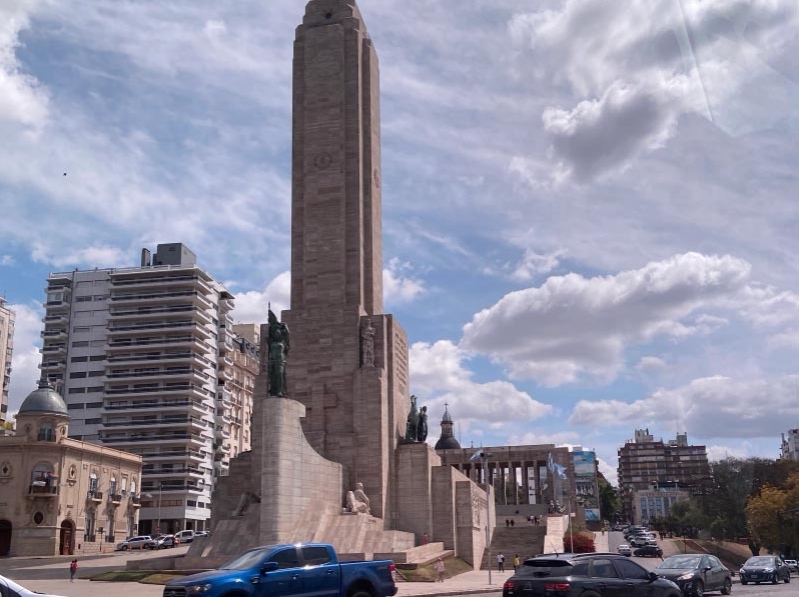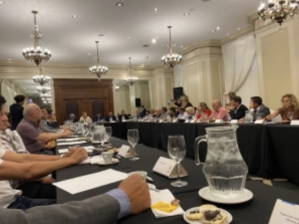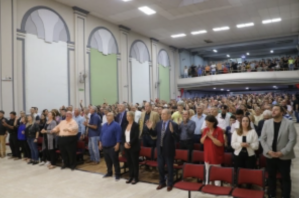
The city of Rosario, Argentina, is reeling in an atmosphere of vulnerability and insecurity amid the threat of drug gangs killing civilians indiscriminately. Although the leaders of most drug gangs are imprisoned, they continue to give orders to those outside the cells and control their actions as if they were still at large.
In the last month alone, three taxi drivers in this city have been killed by hit men. Then a trolley bus driver, and days later a 25-year-old gas station worker.
The ordinary citizen knows that the bullet can hit anyone. There is no security in the streets. There are no guarantees for the protection of civil society.
This story has been going on for a long time according Pastor José Luis Urso, coordinator of the Rosario Pastors' Council. He serves as a local spokesman for the media and explains how the evangelical church is providing aid in the absence of the state.
But that is not enough, he says. Rosario has been paralyzed by fear in the face of this new wave of violence. Demands and protests of the citizens have not been able to break the terror that organized crime has implanted in recent weeks. Instead, the drug groups have united to issue threats to the people of the city and will try to carry them out.
Amid the situation, the Association of Psychoanalysis of Rosario (APR) issued a statement entitled "Manifesto in the Face of Terror" to express its position against "cowardly terrorism."
"In the last few days, the city of Rosario and its inhabitants have been victims of terrorist acts that show a total disregard for life and a clear intention to create a state of horror and stupor in the people, transforming the ordinary citizen into a mere object to carve messages for third parties in blood and fire," reads the text published by the APR.
Lisandro Leoni, a local journalist, told the national media that "the drug gangs act with the collusion of the police. And he said that "we have been analyzing this phenomenon for 20 years, we have been looking for different voices to try to find a solution, but it does not come. The political leadership never rises to the occasion. All the criminal gangs in the city of Rosario are a mixture of civilians and police. If there are no police in the gangs, there is police complicity or economic retaliation, everything has a price, they are bought. Today we can say that most of the leaders of the major drug gangs in Rosario are behind bars, but they continue to operate."
Pastor Urso told Christian Daily International that the city "nowadays is suffering the attacks of narco-terrorism where the enemy seems 'invisible' and attacks anyone without warning." And he added that "this is the product, among other things, of the disintegration of the family, bad social policies and above all the corruption in the government that preceded the one that is currently in power and that has promised to restore the social order. Such new policies provoke a reaction of the gangs, which, not being able to sustain the power they had, started to act against the people, even those who have no connection with these mafias at all."
The evangelical Church joining every effort in prayer and action
Speaking about the influence of the evangelical church, he explained that "the most novel part is that we began to participate as a Council of Pastors in all efforts of those groups that seek to bring peace to the city, such as the Economic and Social Council, Interreligious Dialogue Table, Multisectoral for Peace, among others. There, we have the opportunity to contribute with our experience and be part of the creation of plans for preventing violence in all its forms, addictions, and other issues. We are always invited to participate in these spaces, an opportunity that we never disregard and that allows us to reach places with the Gospel that were unthinkable at other times."

Some 38 years ago, the Church of Rosario established a fellowship among all evangelical denominations, strengthened by the formation of the Council of Pastors, which was created to unite efforts in evangelism, cooperation, and outreach of the Church in the city.
The coordinator of the Council of Pastors pointed out that "in every city, the Church is like a significant social thermometer, as it is present throughout the territory and its contact with the people allows it to see the realities that are emerging at different times, often before the state itself."
Urso attended a meeting with the Mayor of Rosario Pablo Javkin and the Governor of the Province of Santa Fe Maximiliano Pullaro. It was a meeting to provide detailed information about the latest security measures agreed between the three levels of the State to face the recent acts of violence suffered by the city that today is completely paralyzed, just as it was in the first weeks of the Covid pandemic in 2019. "There is not a soul in the street!" a magazine stall vendor told Christian Daily International.

On March 15, there was a call for a joint prayer initiated by the Pastors' Council of Rosario. It was originally planned to be held at the National Flag Monument, but finally had to be moved to the Convention Center of the Evangelical Missionary Church of Argentina due to weather conditions.
Pastors gathered to pray for specific topics such as the city overall, the people suffering due to addictions, the families, the government authorities, and the delicate situation in which the city is immersed. Government authorities such as the vice governor of the province Gisela Scaglia and the province representatives Carlos Bermudez and Walter Ghione were there. Also attending were the president of the Evangelical Christian Alliance of the Argentine Republic (ACIERA) Pastor Christian Hooft and its executive director Pastor Jorge Gomez.
Originally published by Diario Cristiano





